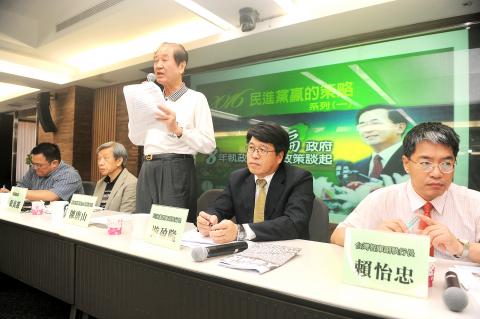|
Forum discusses DPP¡¦s China, 2016
strategy
By Chris Wang / Staff reporter

Ketagalan Foundation chairman
Mark Chen speaks at a forum discussing the Democratic Progressive Party¡¦s
strategy for returning to power.
Photo: Liao Chen-huei, Taipei Times
Comparing the Democratic Progressive
Party¡¦s (DPP) China policy under former president Chen Shui-bian (³¯¤ô«ó) and the
party¡¦s current policy is hard because of the rapidly changing dynamics of
international politics, but there is no doubt that cross-strait policy during
the Chen era was more than ¡§eight lost years,¡¨ as some say, DPP members and
academics said yesterday.
¡§The years between 2000 and 2008 were not lost years, but eight legendary,
glorious years,¡¨ You Ying-lung (´å¬Õ¶©), deputy executive director of the DPP¡¦s
think tank, told a forum in Taipei.
The forum, focused on the DPP¡¦s China policy during Chen¡¦s years in office and
the party¡¦s winning strategy in the 2016 presidential election, was organized by
the Ketagalan Foundation, which was founded by the former president.
You, who served in the DPP administration as vice chairman of the Straits
Exchange Foundation, praised Chen as a pragmatic idealist, a practitioner of de
jure independence and a leader who dared to confront Beijing and Washington to
safeguard the nation¡¦s interests.
Chen, who is serving a 20-year sentence for corruption charges, extended olive
branches to China before July 2002, but dramatically changed his cross-strait
policy after Beijing humiliated him by establishing diplomatic ties with Nauru,
a former Taiwan ally, on the day he was sworn in as DPP chairman, You said.
Determined to walk his own path after that, Chen proposed the ¡§one country on
each side¡¨ initiative, holding several national referendums and staging
discussions to write a new Constitution, You said.
While Chen¡¦s legacy is debatable, the former president remains to this day the
only DPP candidate to have won a Taipei mayoral election and two presidential
elections, and has shown what it takes for to succeed politically, he said.
¡§The winning formula for a candidate is to be political and professional
competent and have strong agenda-setting ability on cross-strait issues,¡¨ You
said.
Meanwhile, Lai I-chung (¿à©É©¾), deputy executive director of the Taiwan Thinktank,
challenged the ¡§myths¡¨ that the triangular relationship between the DPP, the
Chinese Nationalist Party (KMT) and the Chinese Communist Party (CCP) is
important and the DPP¡¦s China policy would be the ¡§last milestone¡¨ the DPP had
to cross to return power.
Overemphasizing the relationship is flawed because, while DPP-CCP talks are
welcome, the administrations of Chen and former president Lee Teng-hui (§õµn½÷)
were still able to facilitate negotiations without ¡§the political foundation¡¨ of
the so-called ¡§1992 consensus,¡¨ he said.
The last milestone for the DPP¡¦s quest to return to power is not its China
policy, but the feasible policy options it proposes for developing the national
economy and trade to places outside of China, such as the ASEAN countries or
India, Lai said.
¡§The last milestone for the DPP is freeing cross-strait policy of CCP-KMT
domination,¡¨ Lai added.
|
![]()
![]()
![]()